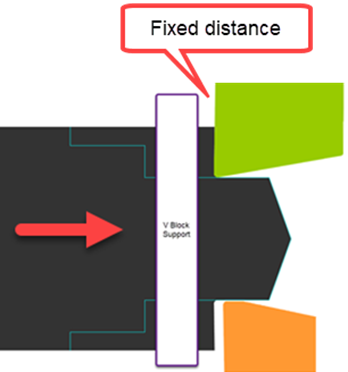The Tailstock Support Provides Flexibility In Grinding A Variety Of Long Series Blanks On The Anca Cpx Linear
As ANCA’s blank grinder, high material removal rates form as the primary function of the CPX Linear machine without compromising on dimensional accuracy and surface finish of <0.2Ra.
The machine utilises the Peel or the Pinch-peel grinding methods, which are designed to adapt to a variety of blank grinding applications. As shown in the image below, the fixed distance of 1-2mm between the grinding wheel and the support adds rigidity at the grind point, allowing the process to utilise higher aggressiveness numbers of the grinding wheels. With these aggressiveness numbers and the CPX Linear’s high torque roughing spindle, a large volume of material can be ground at high material removal rates.

Grinding with Tailstock support
Long series drills are common examples of slender blanks defined from its diameter to length ratio. As the blanks are ground at a high RPM and travels out of the V block support, the slenderness of the blanks causes whipping of blanks at the front end of the blank – which occasionally leads to breakage of blanks. To put it simply, the whipping of blanks is the blank runout at its unsupported end.
The CPX Tailstock is designed to dynamically pick and support the whipping front end of the blank, using support from a pneumatic cylinder with back pressure. The back pressure is adjustable and is a value entered by the user in the blank grinding program. For example, a D1mm x 200mm blank will have a much smaller back pressure value compared to a D10mm x 200mm.

The Tailstock supports the blank using female centers with choice of angles, providing the flexibility to grind a variety of long series blanks. The image below shows the top view of how the blanks are ground with the tailstock support.
The Tailstock is just one of several options and features available on the CPX Linear to increase productivity and to provide grinding process control solutions in blank grinding.
This content was first published on the ANCA website.

